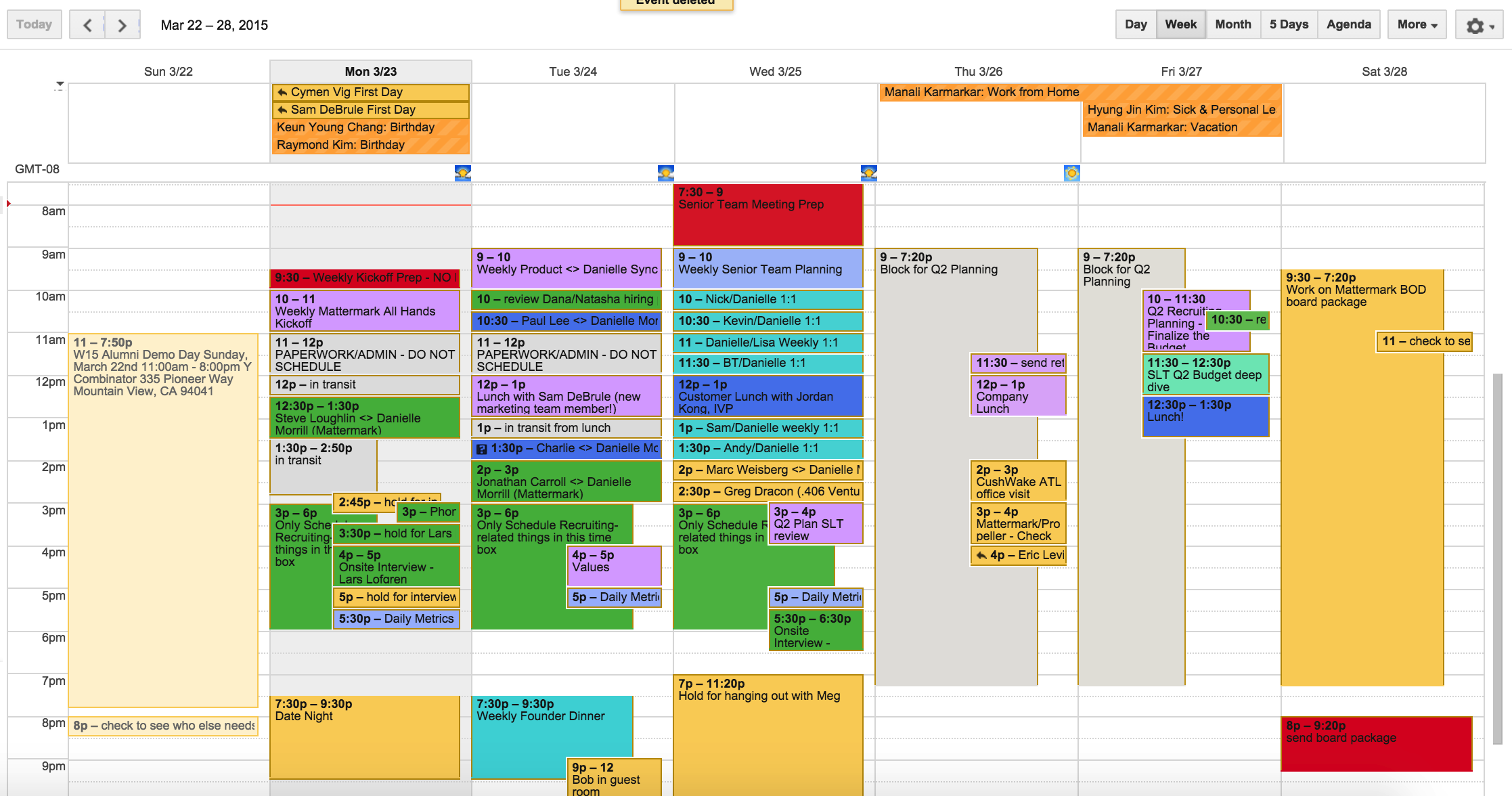When I start a new coaching relationship with a manager, the very first thing I ask them is to show me their calendar. It usually looks like this.

I call it the swiss cheese calendar: blocks of uninterrupted meetings, with holes here and there. In some extreme cases, the manager doesn’t even have time for lunch, let alone breaks. What’s striking is that most managers assume this is a typical schedule when you become a manager. In his Maker’s Schedule, Manager’s Schedule essay, even Paul Graham puts it like this:
The manager’s schedule is for bosses. It’s embodied in the traditional appointment book, with each day cut into one hour intervals. You can block off several hours for a single task if you need to, but by default you change what you’re doing every hour.
Unfortunately, since everyone assumes managers should jump from meetings to meetings to “help” the team, it’s hard to realise that this behaviour goes against the manager’s mission to set and reach team objectives by enabling individual team members to give their very best.
First of all, how can you identify the very best goals for your team and work on improving them if you don’t have time for it? Goal setting and continuous improvement require managers to take a step back, reflect and think. It’s a maker activity and an essential one for managers. Instead, since managers accept meeting requests as long as they have free slots, their calendar essentially becomes other people’s to-do list. They don’t define their schedule anymore; it’s their schedule that defines them.
Second, how can you enable team members to give their very best, and continuously improve their skills and behaviours, if you don’t allocate enough time to listen to them, coach them and train them? Most managers I work with have little to no one-on-one(s) with team members and rarely dedicate time to specific training. For some reason, they expect team members to learn by watching them or pick up skills and knowledge through random Q&A. Instead, if managers had dedicated time in their schedule to help everyone in their team identify growth opportunities, then acquire new skills through coaching and training, they would have much more control over individual performance and morale.
Let's take a look at Mark, a typical engineering manager that spends his day in meetings, answering Slack messages as they come and getting "work done" whenever possible. Mark is exhausted but frustrated, but he believes that acting like this helps his team and company.
Because of all the workload and the endless meetings, Mark spends little to no time with team members. One-on-one(s) are status meetings and happen every other week when he doesn't cancel them because of the last emergency. With this setup, Mark has no way to identify potential morale issues within the team. Individuals are left alone to improve their performance (which is poorly measured since Mark doesn't have the time to set reasonable objectives). Mark is failing as a manager.
Like Mark, spending your day in meetings goes against your mission as a manager. You should instead:
1/ Block uninterrupted deep work sessions in your calendar (ideally two hours in the morning) to work on the maker side of management: goal setting, team performance improvement, strategy, organisational design, reporting...
2/ Invest time in each team members to help them grow (ideally one hour of one-on-one per week + two or three hours of group training depending on the topic)
3/ Schedule your week in advance so that you decide when you’re available for meetings with other colleagues, including your team status meetings (while staying agile in case of exceptions or emergencies). As put by Paul Graham:
How do we manage to advise so many startups on the maker’s schedule? By using the classic device for simulating the manager’s schedule within the maker’s: office hours. Several times a week I set aside a chunk of time to meet founders we’ve funded.
For example, if a manager has a 7-person team, they would spend two hours per day on deep work (so 10 hours per week) + one hour per team member on one-on-one(s) (so 7 hours per week) + 3 hours on team training = 20 hours. Suppose you work 40 hours per week, which leaves you a good 20 hours for interaction activities: meetings, standups, emails and Slack messages. Not bad!
One last note on Slack (and related) messages and emails: if they keep popping up, you won’t be able to be focused during your deep work sessions nor your one-on-one(s). Like meetings, you should have dedicated time to answer these messages by blocking 15-minutes slots three or four times per day. I doubt the world will stop turning if you take 3 hours to answer a message and, if the platform is burning, your colleagues have your phone number 😉
To go further
📼 Time management (reserved for members, let me know to get access)
📖 Deep Work: Rules for Focused Success in a Distracted World - Cal Newport
📖 Make Time: How to focus on what matters every day - Jake Knapp, John Zeratsky

Are you ready to scale your engineering team and grow as a leader?
Membership includes weekly live learning sessions, online resources, exclusive events and a community of 100+ engineering leaders
